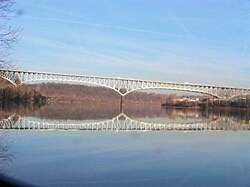Homestead Grays Bridge
Homestead Grays Bridge | |
|---|---|
 View of the Homestead Grays Bridge | |
| Coordinates | 40°24′39″N 79°55′08″W / 40.41083°N 79.91889°W |
| Carries | Blue Belt |
| Crosses | Monongahela River |
| Locale | Allegheny, Pennsylvania, United States |
| Official name | Homestead Grays Bridge |
| Other name(s) | Pittsburgh-Homestead High Level Bridge |
| Named for | Homestead Grays |
| Maintained by | Allegheny County |
| NBI Number | 027301304723920[permanent dead link] |
| Characteristics | |
| Design | Truss bridge |
| Total length | 3,750 ft (1,140 m) |
| Height | 49.9 ft (15.2 m) |
| History | |
| Built | 1936 |
| Designated | 2001[1] |
| Location | |
 | |
The Homestead Grays Bridge, also known as the (Homestead) High Level Bridge, was built in 1936 and spans the Monongahela River between Homestead Borough and the southernmost tip of Pittsburgh's Squirrel Hill neighborhood.[2] It is notable as the first bridge to incorporate the Wichert Truss, which uses a quadrilateral shape over each support, into its design. This made the truss statically determinate, so that forces in the structural members could be calculated. There are very few surviving Wichert Truss bridges, including one other example in Pittsburgh, the Charles Anderson Memorial Bridge.[3]
History
[edit]The bridge was dedicated on Saturday November 20, 1937, having cost the county of Allegheny $2.75 million to build and originally carried four highway lanes and two streetcar tracks of Pittsburgh Railways Company.[4] It replaced the 1897 Brown's Bridge (Homestead and Highland Bridge) which was upstream and had linked Brown's Hill Rd on the north bank and Second Avenue between Ann Street and Amity Street, Homestead on the south bank.[citation needed]
In 1979, the bridge was renovated.
On July 11, 2002, the Homestead High-Level Bridge was renamed the Homestead Grays Bridge in honor of the Homestead Grays baseball team.[5]
In 2006 and 2007 work was undertaken to rehabilitate the bridge: the deck was removed and the structure stripped down to the steel, then the steel structure repaired and a new, wider deck put on. The new deck is six feet wider in traffic lanes—three feet on each side—and also has broader pedestrian walkways. The railings and lighting were replaced with reproductions of historic models, and the entire structure received a new coat of blue-grey paint.
See also
[edit]References
[edit]- ^ Historic Landmark Plaques 1968-2009 (PDF). Pittsburgh, PA: Pittsburgh History & Landmarks Foundation. 2010. Retrieved 2010-07-02.
- ^ "Squirrel Hill South (map)" (PDF). City of Pittsburgh. Archived from the original (PDF) on July 21, 2004. Retrieved June 3, 2010.
- ^ Wilson, Helen; Wilson, Todd (November 2017). "From Browns to Grays: Evolution of the Homestead Grays Bridge" (PDF). Historic Bridge Bulletin. 4 (3): 5–9. Retrieved August 27, 2022.
- ^ "Homestead High Level Bridge". Pittsburgh Post-Gazette. November 19, 1937. Retrieved November 21, 2009.[permanent dead link]
- ^ "High-Level Bridge Renamed For Homestead Grays". ThePittsburghChannel.com. July 11, 2002. Archived from the original on July 13, 2002. Retrieved December 21, 2009.
External links
[edit]- Pittsburgh bridges
- "Homestead Grays Bridge work set for March" (Pittsburgh Post-Gazette)
- Homestead span honors baseball team — Pittsburgh Post-Gazette article on the renaming of the Homestead Grays Bridge
- Why was it called the "High-Level" Bridge?[permanent dead link] — Pittsburgh City Paper column explaining some of the history of the bridge
- Homestead Grays bridge to gain 18 plaques honoring Negro League Greats[permanent dead link]
- Bridges and Tunnels of Allegheny County "Homestead High-Level Bridge"
- Bridges in Pittsburgh
- Bridges over the Monongahela River
- Bridges completed in 1937
- Homestead Grays
- Road bridges on the National Register of Historic Places in Pennsylvania
- Pittsburgh History & Landmarks Foundation Historic Landmarks
- Homestead, Pennsylvania
- National Register of Historic Places in Pittsburgh
- Steel bridges in the United States
- 1937 establishments in Pennsylvania


